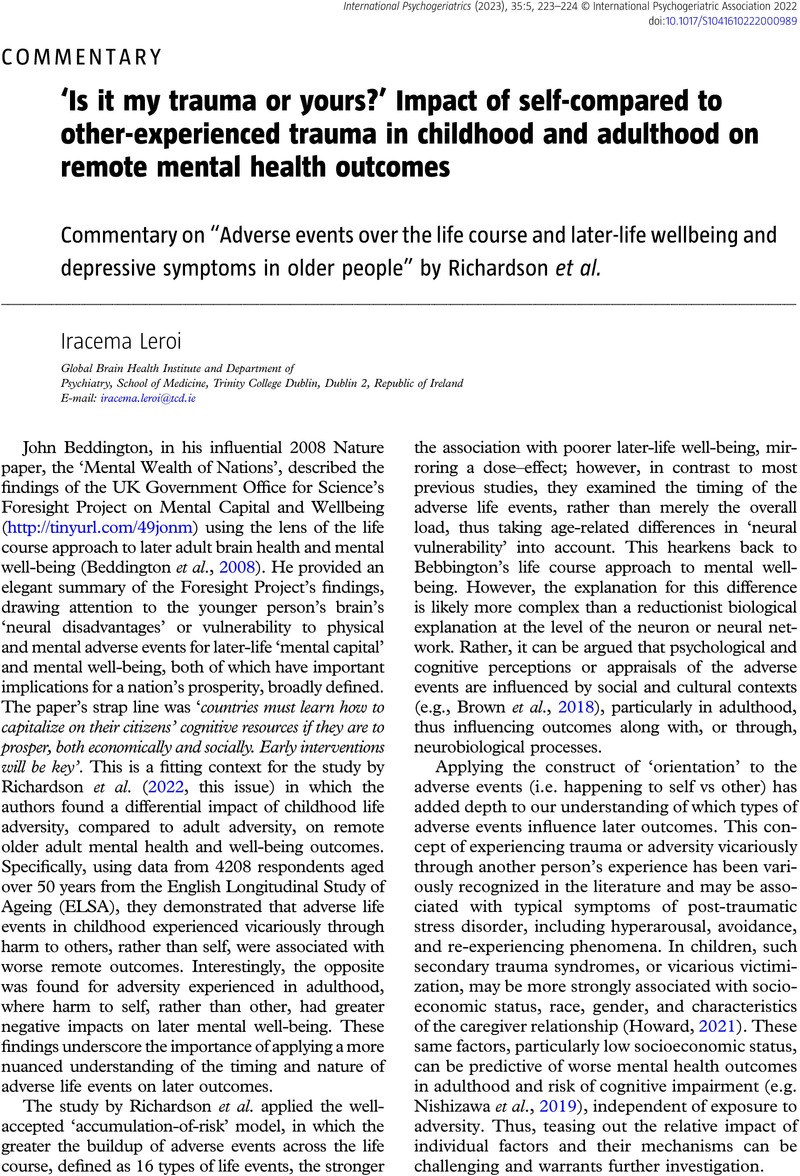No CrossRef data available.
Article contents
‘Is it my trauma or yours?’ Impact of self-compared to other-experienced trauma in childhood and adulthood on remote mental health outcomes
Commentary on “Adverse events over the life course and later-life wellbeing and depressive symptoms in older people” by Richardson et al.
Published online by Cambridge University Press: 01 December 2022
Abstract
An abstract is not available for this content so a preview has been provided. Please use the Get access link above for information on how to access this content.

- Type
- Commentary
- Information
- Copyright
- © International Psychogeriatric Association 2022
References
Beddington, J. et al. (2008). The mental wealth of nations. Nature, 455, 1057–1060. DOI 10.1038/4551057a.CrossRefGoogle ScholarPubMed
Black, M. M. et al. (2017). Early childhood development coming of age: science through the life course. The Lancet, 389, 77–90.CrossRefGoogle ScholarPubMed
Brown, L. L., Mitchell, U. A. and Ailshire, J. (2018). Disentangling the stress process: race/ethnic differences in the exposure and appraisal of chronic stressors among older adults. The Journals of Gerontology, Series B: Psychological Sciences and Social Sciences, 75, 650–660. DOI 10.1093/geronb/gby072.CrossRefGoogle Scholar
Chen, Y., Demnitz, N., Yamamoto, S., Yaffe, K., Lawlor, B. and Leroi, I. (2022). Defining brain health: a concept analysis. International Journal of Geriatric Psychiatry, 37. DOI 10.1002/gps.5564.CrossRefGoogle Scholar
Howard, S. (2021). A causal model of children’s vicarious traumatization. Journal of Child & Adolescent Trauma, 14, 443–454. DOI 10.1007/s40653-020-00331-z.CrossRefGoogle ScholarPubMed
Nishizawa, T., Morita, A., Fujiwara, T. and Kondo, K. (2019). Association between childhood socioeconomic status and subjective memory complaints among older adults: results from the Japan Gerontological Evaluation Study 2010. International Psychogeriatrics, 31, 1699–1707. DOI 10.1017/S1041610219000814.CrossRefGoogle ScholarPubMed
Richardson, S., Carr, E., Netuveli, G. and Sacker, A. (2022). Adverse events over the life course and later-life wellbeing and depressive symptoms in older people. International Psychogeriatrics, 35, 243–257.Google Scholar
Treichler, E. et al. (2020). A pragmatic trial of a group intervention in senior housing communities to increase resilience. International Psychogeriatrics, 32, 173–182. DOI 10.1017/S1041610219002096.CrossRefGoogle ScholarPubMed
Vatter, S. and Leroi, I. (2022). Resilience in people with Lewy body disorders and their care partners: association with mental health, relationship satisfaction, and care burden. Brain Science, 23,148. DOI 10.3390/brainsci12020148.CrossRefGoogle Scholar
Williamson, W. and Leroi, I. (2019). Thinking about dementia: is childhood too early? International Psychogeriatrics, 31, 1689–1690. DOI 10.1017/S1041610219001157.CrossRefGoogle ScholarPubMed




